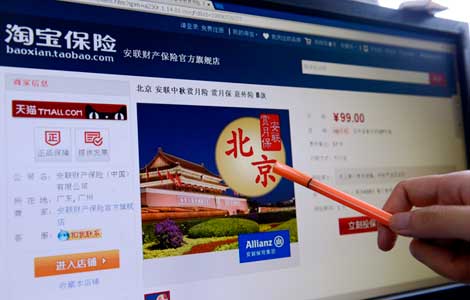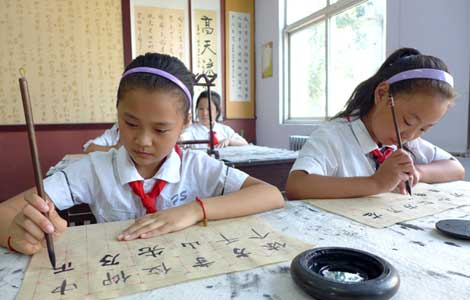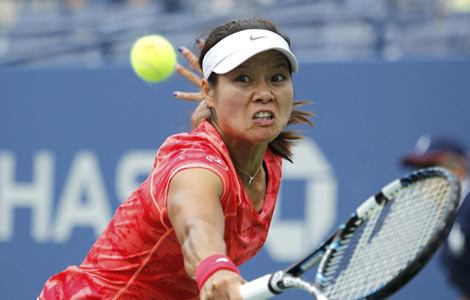China gearing up for key plenary session
Updated: 2013-08-28 10:50
By Zhao Yinan and Hou Liqiang in Beijing and Zhang Yuwei in New York (China Daily)
|
||||||||
China's senior Party members will meet in November in Beijing to discuss deepening reforms, according to a meeting of the Party's political bureau on Tuesday, which adopted plans for streamlining local government, and preventing and punishing corruption over the next four years.
A statement released after the meeting underlined the significance of a comprehensive and deepening reform. "It will help resolve outstanding conflicts and challenges China faces in the course of its development, and will be conducive to achieving sustainable and healthy economic and social development," it read.
"Reform and opening up should be continuous and never stop. Standing still or going backward will lead to a dead end," it said.
The Third Plenary Session of the 18th Communist Party of China Central Committee to be held in November is seen to set China's economic agenda, said experts.
The past three decades have shown that the third plenums are usually agenda-setting conferences at which the leadership maps out its vision for China, mostly in the economic sphere.
Jon Taylor, a professor of political science at the University of St. Thomas in Houston, said the meeting will "help to flesh out" the reform signals given by the new leadership.
"Commonly, the first two plenary sessions of each CPC Central Committee focus primarily on personnel changes within the Party, while the third plenary session is traditionally devoted to formulating policy and revealing the goals of China's leaders," said Taylor, an avid China watcher.
"I think that we may very well see some hukou (China's household registration system) reform, related directly to plans to encourage greater urbanization," said Taylor. "An easing of household registration would make that task much smoother."
Wu Hui, a professor at the Party School of the CPC Central Committee, said any reform being proposed will likely be gradual.
Allowing society and enterprises to play a bigger role and restricting the government's unnecessary involvement in the market economy might be topics at the meeting, Wu said.
"Less restriction from the government means more vitality from the market," he said.
Wu also suggested the government retreat from its current role of driving economic growth to provide more public services - a transformation that has been urged for years.
Wu also noted deepening reform should be conducted along with anti-graft efforts. "Without cracking down on corruption, the change of government function cannot be conducted smoothly," he said.
Long Pingping, a researcher from the Party's Literature Research Office, said, "The third plenums are important because many groundbreaking policies that shape China's economy are worked out at these meetings."
He said the third plenum is usually convened at a time when the new leadership of the Party has learned more about the country after stepping into office.
"The leadership's vision about deepening reform will become a national strategy after being endorsed at the plenum," he said.
Taylor said the most urgent issues include linking local government debt audits to Party and State disciplinary structures, strengthening transparency and control mechanisms, reforming the pension system, raising the retirement age, and shadow banking.
"These are all systemic problems that could threaten China's social stability," said Taylor.
Contact the writers at zhaoyinan@chinadaily.com.cn, houliqiang@chinadaily.com.cn and yuweizhang@chinadailyusa.com
(China Daily USA 08/28/2013 page1)

 Moscow air show opens with flight demonstrations
Moscow air show opens with flight demonstrations
 US preparing for probable strike on Syria
US preparing for probable strike on Syria
 Putting money on full moon
Putting money on full moon
 Language list aims to pass on Chinese culture
Language list aims to pass on Chinese culture
 Cancer patient delivers healthy baby
Cancer patient delivers healthy baby
 Chinese navy starts escort mission at Gulf of Aden
Chinese navy starts escort mission at Gulf of Aden
 McGrady retires, considers career in China
McGrady retires, considers career in China
 Li Na breezes into US Open second round
Li Na breezes into US Open second round
Most Viewed
Editor's Picks

|

|

|

|

|

|
Today's Top News
Global expertise a scarce asset for employers
Japan suspends rocket launch at last minute
Affluent Chinese pursue overseas properties
Sino-Japanese meeting at G20 ruled out
New time limits for visa processing
China joins global effort to combat tax evasion
Party's plenum to focus on reform
Chinese negotiator in DPRK
US Weekly

|

|







